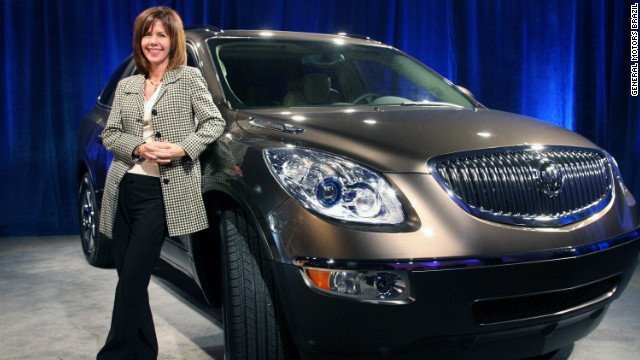Today, 34 years on, she is president and managing director of General Motors, Brazil, and trying to persuade more young women to reach the top in the car industry.
Lieblein says she has "gas in my veins." She studied engineering at what was then General Motors Institute, now Kettering University, in Flint, Michigan, and has worked for the company ever since.
Before moving to Brazil, she was chief engineer for vehicles such as the Buick Enclave and Chevy Traverse, and then president and managing director of General Motors in Mexico.
"My feeling was always, I'm going to get in and I'm going to do the best job that I can and I will build my credibility from there," she said.
"With that attitude I was able to win over some skeptics, and for those who maybe didn't change their mind, I figured that's their problem. That is not my problem."
Despite the progress, Lieblein is still working in a male-dominated environment.
Women made up just under 21% of employees in car manufacturing in the United States, and 16% of executives and senior management, according to a 2010 Equal Opportunity Employment Commission report.
Yet women buy 52% of all new cars in the United States, and influence more than 85% of sales, according to Forbes, so manufacturers should have a high incentive for reaching out to women.
Lieblein recognized this while working as chief engineer for the launch of the Buick Enclave in 2008. The car includes a dip in floor on the driver's side for women wearing high heels.
"The vehicle line executive was a woman, I was a chief engineer as a woman, my assistant chief engineer was a woman, a lot of my development engineers were women, our vehicle line director was a woman" said Lieblein.
"I don't know if the vehicle would have turned out differently if we hadn't had been a part of it.
"When we were launching the Buick Enclave or the Chevrolet Traverse, we did a lot of connection with mommy bloggers because we saw them as some of our key customers. It was a really great opportunity."
To encourage others to follow her into the boardroom, Lieblein has mentored young women, making sure they get the right assignments to make the most of their career.
"I picked out five young women and I helped to move them where they needed to go," she said. "I was able to take (on) these women and I tried to make sure they got the right assignments.
"When they look at senior leaders, they think that their life can only be work. So one thing that I really try and share with young people is that you can have a successful career but also a successful family life as well."
While Lieblein and others have successfully risen through the ranks, the industry is struggling to attract and retain women in its senior positions.
When Automotive News compiled its list of "100 Leading Women in the North American Automotive Industry" in 2010, it found fewer women in the most senior positions than on its previous list in 2005.
There were just two women CEOs in 2010, down from five in 2005, and 51 women with executive officer titles, compared with 64 in 2005.
Deloitte carried out a survey of the 100 leading women to find out what was going wrong.
Its report "Women at the Wheel" found 56% of the women said their companies did not have an active recruitment program targeting women, and none thought the school system encouraged girls to pursue careers in the industry.
One senior woman told the report that engineering needed to improve its image in line with the "Hollywood-ization" of other careers such as medicine and law.
There are programs encouraging women in the industry. The Detroit-based Automotive Women's Alliance Foundation and the Women's Automotive Association International both offer scholarships to help women pursue careers in the industry.
In the UK, Sarah Sillars, outgoing executive chair of the Institute of the Motor Industry, which represents car retailers, is about to take over as chief executive of the Sector Skills Council for Science, Engineering and Manufacturing Technologies.
"We have got an image problem, and I don't think the industry has done enough to educate teachers, parents and careers advisers about opportunities and what it's like to work in the motor trade," said Sillars.
"There are lots of companies that go into schools in their localities, but we need to do that on a broader scale."
She said getting more girls to consider a career in engineering would be one of her top three priorities in her new job at the Sector Skills Council.
Lieblein, too, believes the task starts in schools, persuading girls to consider engineering.
"What we can do is really try and reach out to girls in middle school and high school, and talk to them about math and science," she said.
"We need to reach out to those young girls and make them see that they have the capability and then show them how engineering can be exciting."
Related News



